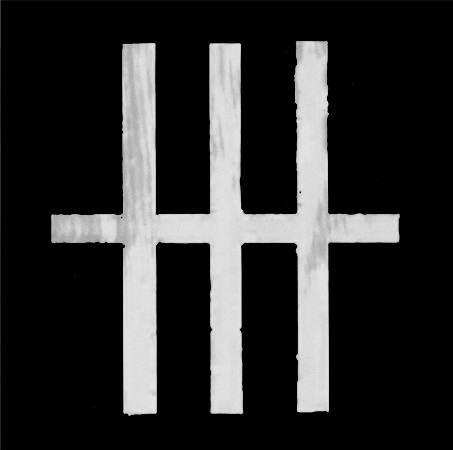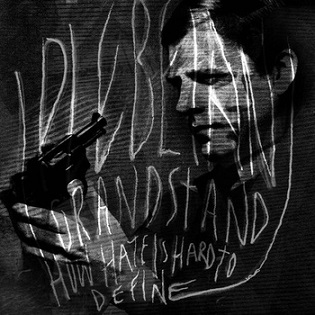bio - RELEASES - INTERVIEWS - REVIEWS
- Country of origin:France
- Location:Toulouse, Occitanie
- Status:Active
- Formed in:2005

- Genre:Avant-garde Black Metal/Mathcore/Powerviolence
- Lyrical themes:Human Behaviour, Deviances, Life Experience
- Current label:Throatruiner Ṙecords
- Years active:2005-present

-
Flails and flames - 75%
triggerhappy, December 19th, 2014
The whole orthodox black metal scene has gotten to a point where individual bands are nearly indistinguishable from one another, but despite that, I don’t think I’ve ever really heard anyone imitate the ones who started all this shit in the first place, Deathspell Omega... until now. Enter Plebeian Grandstand. Filled with immense, searing rage, their latest effort Lowgazers is a frightening blend of chaotic sludge and black metal that has somehow oddly turned out to be the closest anyone has ever gotten to mimicking the angular, dissonant melodicisms of Paracletus.
It starts off with Thrvst, which is no doubt the most intense on the record; every single riff on it is simply incredible, striking a perfect balance between frenetic blasting and desolate sludge dirges. Granted, there are a few sections on the album (the latter half of Endless Craving, for example) that lean more towards the mechanical arrangements of Abigor, but the writhing, ever-shifting time signatures of Lowlifer and scalding tremolos of Aimless Roaming are tell-tale signs of guitarist Simon’s influences. Along the way, Lowgazers hits a couple of snags – Relief of Troth is two minutes of ambience, which didn’t really seem necessary, and it doesn’t help that it’s followed by the rather aimless Svn in Your Head, which is the sludgiest song on the record, but the lack of balance makes for a rather dull result – but the last two tracks easily make up for it, rounding out the album with yet more vicious black metal riffing.
What separates Plebeian Grandstand from Deathspell Omega is that they possess an undiluted fury that the latter, constantly caught up in their pseudo-intellectual ramblings on religion, never quite got to unleash. A lot of it is thanks to the blistering howls of Adrian, which are a far better fit for this type of music than Mikko Aspa ever was. (I’ve never liked the guy’s piggish grunt, so it’s refreshing to hear someone else over this kind of music.) Together with the intricately crafted drum patterns of Ivo – reminiscent of Jamie Saint Merat of Ulcerate due to the velocity at which they are played – and the claustrophobic, crushing production, not a single of ounce of animosity is wasted on this record.
All in all, Lowgazers is a far cry from the band’s equally aggressive but less refined hardcore beginnings. “Paracletus 2.0” might be a crude description, but it’s not an inaccurate one. It’s funny because Plebeian Grandstand are anything but orthodox black metal, so if you’re like me and enjoy Paracletus despite thinking that most orthodox is at best derivative (and at worst absolute garbage), then do yourself a favour and give Lowgazers a listen.

| Name | Type | Year |
|---|---|---|
| The Vulture's Riot | EP | 2007 |
| How Hate Is Hard to Define | Full-length | 2010 |
| Bone Dance / Divider / Plebeian Grandstand | Split | 2011 |
| Plebeian Grandstand / Cortez | Split | 2012 |
| Lowgazers | Full-length | 2014 |
| False Highs, True Lows | Full-length | 2016 |
Acute pain as the only flavour - 90%
Plebeian Grandstand's first full-length album isn't a black metal album. Its bones are mathcore and its muscles blackened. With genres out of the way, it's easier to talk about the music -- the organs that keep the system working. How Hate Is Hard to Define's core appeal is emotion. This album deals in pain, anger and frustration.
How Hate Is Hard to Define takes cues from hardcore's brevity and limits itself to a mere 35 minutes. This is very welcome, as these 35 minutes are moody, intense, and very, very loud. The instrumental intro track opens up with distorted guitar -- there's no gentle acoustics here. Soon after, drums start "Ordo ab Chao" and the band goes on full blast. The vocals are howled directly into the mic, and there are heavy distortion on the vocals because of this. Comparisons can be made to Japanoise vocals, namely Masonna's Spectrum Ripper. The drums are loud and prominent in the mix, and occasionally seem to almost clip through the audio ceiling when the band starts blasting. Everything serves to be loud and angry, save for the guitar tone. relatively non-distorted and mercifully not utilizing the standard "mathcore" setting, it's a melodic tone that conveys emotion without sounding sappy and polished.
This melodicism is the vehicle that the band's emotion is conveyed with. Plebeian Grandstand don't just blast and shriek with no regard to meter and rhythm; they know how to write affecting melodies. Highlights include the second half of "How Hate Is Hard to Define", the guitar solo that morphs into an outro in "Easy to Hate / Hard to Define" that break up the meterless mathcore with (effectively) affecting melody, with heavy black metal influence. The melodic sections are kept brief and never overtake the anger and hate of the mathcore. This delicate balancing act stops the music from ever feeling stagnant and boring. Rage and fury relents and gives way to sadness. Sadness gives way to resignation that morphs back into anger. Every song has multiple moods with varying degrees of prominence. This never gets too excessive, again due to the short album length.
The production, while compressed and brickwalled, has a very good mix. The mix is instrumental in making sure that the melodicism isn't lost in the mathcore chaos, and making sure the drums are clear and crisp. The bass is mostly missing from the mix, but that comes with the territory in punk.
How Hate Is Hard to Define is a success. In the end, it is not an album for everybody; the closest comparison would have to be Deathspell Omega's Drought by way of Gaza; not the most appealing type of music. Plebeian Grandstand would eventually abandon their mathcore sound by the time their second album comes out, opting for a more Deathspelly flavour, but to me, this is their pinnacle and magnum opus.

Nightmare music - 80%
This raging cacophony of violent negativity is almost too much to take in on one listen, and certainly demands repeated, careful listens with an open mind. The core of this French band's sound draws on the legacy of their country's vibrant black metal scene, but despite its concise runtime, the band also explore a surprisingly diverse range of musical textures and forms from raw, harsh noise and thundering beats to drone metal. In the hands of Plebeian Grandstand, guitars are turned into contorted, terrifying instruments; the chaotic, dissonant chords and riffs turn order into chaos and then both are lost to the swirling madness at the heart of this record. This extreme sensibility is compounded by the frenetic blastbeats and unpredictable fills, as well as the unhinged vocal-work of Adrien Broué.
The album was clearly thoughtfully conceived from start to finish, such that while the core of the album is comprised of the more straightforward black metal songs such as the aggressive "Low Empire", the menacing "Tributes and Oblivion", dirge-like "Oculi Lac" and mind-bending "Eros Culture", these are also complemented by more experimental pieces. The brief opener "Mal du siècle" (French: Evil of the century) sets the album's consistently dark tone, while the harsh noise, rumbling bass, and jarring feedback of interlude "Mineral Tears" neatly sets up the droning weight of "Oculi Lac". And on "Tame the Shapes", the band construct an imposing wall of dissonant, reverb-heavy drone metal, drenched in noise and feedback, which reaches its crescendo at the end. The album ends with "Eros Culture", perhaps my favourite song on the album, a passionate, twisted animal of a track, which concludes with a single incredibly eerie, dissonant riff played over the relentless blastbeats, growing louder and noisier until the track comes to an abrupt close.
False Highs, True Lows is one of the most aggressively negative, nightmarish records you'll ever have the pleasure of hearing. It embeds itself in your head and stays there, inflicting its malicious energies on the listener long after they have put the album aside. And yet there is something beautiful and fascinating about the complexity and thoughtfulness of this record, that inspires a kind of morbid fascination. Repeated listens expose new, darker depths to one of 2016's finest metal albums.
Review originally written for Metal Void.

Not for the plebs - 95%
How does one combine the tempestuous technicality of mathcore, the ravaging intensity of powerviolence and the hivernal atmosphere of black metal, without making all these components sound so poorly pieced together that they may as well be 3 different bands recorded separately, but then mixed together during the mastering of the album? Well, whatever the solution to this dilemma may be, it is probably answered by the newest Plebeian Grandstand’s release “False Highs, True Lows” that takes the rmost recognizable elements of all of these genres, and shapes them into a satisfactory and seamless malice that was already established on their sophomore effort.
From its first minute, this album avoids gimmicks and sidetracks. No, you won’t be hearing non-stop tremolos and blast beats, however technical they are, as the calculated commotion with sizzle down into more atmospheric segues, often some mid-paced parts with quite a lot of feedback from the guitars, but it will never allow you a comfortable and laidback approach to it. The drums will proceed with meticulous mastery, and guitar with piercing pedantry to sow their aural assault and discord. Imagine Mutilation Rites with aggression amplified by a thousandfold. Imagine Liturgy if they ventured outside the safe confines of their brand of avant garde blackness, and dared to add some credulity and substance to their output. This is how tormented and terrorizing these guys are. And it is something you will experience from the very start, with the first track proper “Low Culture” switching tempos every second. “Volition” seemingly starts in a much more restrained manner, but even when blast beats are omitted, the furious and thunderous double bass has you awaiting another eruption, before it occurs in all its adorable morbidity. “Tame the Shapes” once more dials the tempo down, but adds some welcome heaviness to the album, with some improvised noodling escalating to a draining and crushing climax. Each track is a miniature masterpiece, but the named ones are perhaps the most memorable, if this term is even applicable to this uncompromising animosity.
With 35 minutes of pure dexterity and delicacy in instrumental department, and the inescapable prowess in songwriting without which most of the music played at such speed would easily fall apart, it is difficult to notice anything outright inadequate about this release. Certainly, the duration is not the best part of it, but diluting it into a more drawn-out experience would definitely damage the brilliance that seeps from every note here. With only six proper tracks, it indeed seems as something fit for temporary consumption and abrupt neglect, but the replay value is imposing, as it is impossible to quickly absorb and analyze the dizziness and discombobulation that this album is so riddled with. I would recommend this album to everyone, but as I’m not sure whether sound can trigger epileptic seizures, I will restrain myself from doing so.



